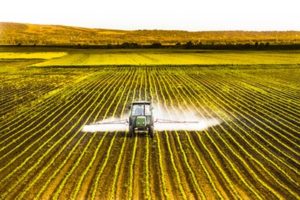Celebrate Rachel Carson (May 27, 1907-April 14, 1964)
During Her 110th Birth Year
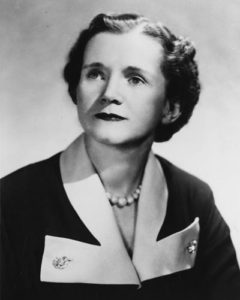 Rachel Carson’s 110th birthday anniversary this year finds more members of the public showing concerns about environmental health and the future of life on earth. The unease of a great many Americans reflects plans by the current administration to reduce funds for environmental protection and scientific research as well as to relinquish protection for certain wild lands currently shielded from natural resource exploitation. Many concerned citizens no longer feel comfortable trusting in “so-called authorities” to take care of things. It seems like a good time to invoke Rachel Carson’s prescient 1962 observation, “A sense of personal responsibility is what we desperately need.” (“The Gentle Storm Center,” Life Magazine, 10-12-62). (see below for How to Honor Rachel Carson’s 110th Birth Year Anniversary)
Rachel Carson’s 110th birthday anniversary this year finds more members of the public showing concerns about environmental health and the future of life on earth. The unease of a great many Americans reflects plans by the current administration to reduce funds for environmental protection and scientific research as well as to relinquish protection for certain wild lands currently shielded from natural resource exploitation. Many concerned citizens no longer feel comfortable trusting in “so-called authorities” to take care of things. It seems like a good time to invoke Rachel Carson’s prescient 1962 observation, “A sense of personal responsibility is what we desperately need.” (“The Gentle Storm Center,” Life Magazine, 10-12-62). (see below for How to Honor Rachel Carson’s 110th Birth Year Anniversary)
In Silent Spring (footnote 1) in her speeches, congressional testimony, and “A New Chapter to Silent Spring,” Rachel Carson offered advice for how to deal with questionable actions by governments or other entities. We look to Rachel Carson’s life and to her writings for inspiration and guidance with present issues.
(Footnote 1) With her book Silent Spring, Carson alerted citizens to the existence of pesticide problems, giving them science-based facts to fight with when they opposed the use of DDT, etc. and in Chapter 17 (“The Other Road”) she offered alternative, effective, non-chemical ways to control pests by providing examples of natural methods of pest control using shrews, bacteria, tiny wasps, sterile male flies, and a beetle to manage pest insects.
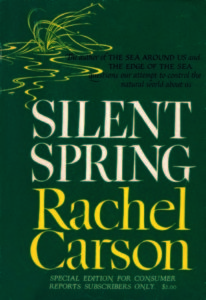 In Silent Spring, Rachel Carson used her writer’s gift and her commitment to scientific truth, in eloquent support of better protection for children, wildlife and the earth from chemical contamination. Following Silent Spring’s publication Carson showed that she could not be silenced by personal attacks from the chemical industry and their supporters in the USDA, many of whom tried unsuccessfully to discredit Silent Spring and defame her (Carson’s) reputation.
In Silent Spring, Rachel Carson used her writer’s gift and her commitment to scientific truth, in eloquent support of better protection for children, wildlife and the earth from chemical contamination. Following Silent Spring’s publication Carson showed that she could not be silenced by personal attacks from the chemical industry and their supporters in the USDA, many of whom tried unsuccessfully to discredit Silent Spring and defame her (Carson’s) reputation.
In her speaking style Rachel Carson was described as having “a quiet delivery and unassuming manner” (in the Bulletin of the Garden Club of America). However, in “A New Chapter to Silent Spring,” (reprinted from a speech Carson gave to Garden Club of America members) her words were strong, resolute and energizing. In it, she insisted that “the burden of proof is on those who would use these [pesticidal] chemicals to prove the procedures are safe.” (“A New Chapter to Silent Spring” Rachel Carson, Bulletin of the Garden Club of America, 1963) Note: Today 55 years later, our government has yet to adopt this policy for pesticides. Instead pesticides are registered by the US Environmental Protection Agency under a risk benefit standard, and sponsors are not permitted to call their pesticide products “safe.”
Carson advised that it is critical to know the source of funding, when evaluating data from a scientific study. She warned that the public needs to be aware that industries, through their financial support, can impact research at universities and can influence findings that may be presented as unbiased but actually favor the industry.
She called on those who care for the earth to remain vigilant… to continue to challenge and to question…[and] “As you listen to the present controversy about pesticides …ask yourself—Who speaks?—And Why?” This advice continues to be relevant in 2017 when the controversies include, in addition to pesticides, such major issues as: climate change, GMOs, and new kinds of technological solutions.
Today, when DDT may be on its way to being phased out worldwide (even for malaria control) there still remains our society’s extravagant use of other toxic chemical pesticides despite the fact that alternative, effective, non-chemical pest control strategies have become increasingly available. In addition, we generate excessive waste and heedless pollution of air and water with plastics, carbon dioxide, and harmful chemicals. These by-products of individuals, industries and societies present known hazards to many of the ecosystem services provided by nature that we cannot do without on planet earth.
Carson cautioned that this “sterile preoccupation with things that are artificial,” leads to “alienation from the sources of our strength [in the natural world]” (R. Carson The Sense of Wonder, 1965).
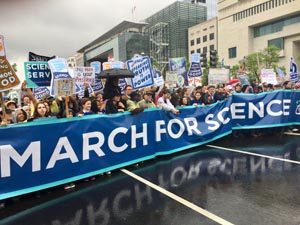 Marchers recently called for greater support of science in our society. Carson’s endorsement of science called on it to reflect nature. In Rachel Carson’s view, scientists’ need to acknowledge the natural world as a factor in their findings and to consider the ways in which their results have environmental impacts. She believed in the need for scientists to learn from nature, and to account for the workings of nature in all aspects of their experiments and in their technological innovations.
Marchers recently called for greater support of science in our society. Carson’s endorsement of science called on it to reflect nature. In Rachel Carson’s view, scientists’ need to acknowledge the natural world as a factor in their findings and to consider the ways in which their results have environmental impacts. She believed in the need for scientists to learn from nature, and to account for the workings of nature in all aspects of their experiments and in their technological innovations.
In Silent Spring Carson introduced the then-new concept of ecology – that all life is inter-related, and people are part of the process. Carson’s work brought a new understanding that humans have a responsibility not only to their own species but to all other species, to preserve a habitable environment. This has been called one of the greatest revolutions in human thought (Kirk Rense). Although this idea may be accepted in theory, to date it has not been sufficiently put into practice to have a significant impact, globally.
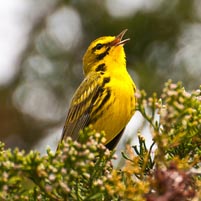 When Carson realized that Silent Spring would accomplish what she intended it to do, she wrote to a friend “…thoughts of all the birds and other creatures and all the loveliness that is in nature came to me with such a surge of deep happiness, that now I had done what I could…” (Brooks, P., The House of Life: Rachel Carson at Work, 1972) (Footnote 2): Carson revealed that successful completion of her extraordinary project (writing Silent Spring) was due to her great love for the natural world, above and beyond her justifiable alarm at pesticides’ toxic effects. In commenting on Carson’s approach Frank Graham, Jr., observed, “I have seen the strongest bonds forged when we bring to the fight… a determination to preserve what we love.”
When Carson realized that Silent Spring would accomplish what she intended it to do, she wrote to a friend “…thoughts of all the birds and other creatures and all the loveliness that is in nature came to me with such a surge of deep happiness, that now I had done what I could…” (Brooks, P., The House of Life: Rachel Carson at Work, 1972) (Footnote 2): Carson revealed that successful completion of her extraordinary project (writing Silent Spring) was due to her great love for the natural world, above and beyond her justifiable alarm at pesticides’ toxic effects. In commenting on Carson’s approach Frank Graham, Jr., observed, “I have seen the strongest bonds forged when we bring to the fight… a determination to preserve what we love.”
Today, love of nature can provide a valuable source of strength to be tapped by those of us determined to protect the earth in the Rachel Carson way.
How to Honor Rachel Carson’s 110th Birth Year Anniversary
![]() Use your talents for writing, art, photography, music, science, or gardening to advocate for things you love about the earth.
Use your talents for writing, art, photography, music, science, or gardening to advocate for things you love about the earth.
![]()
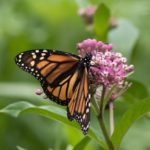 Support native, organic plantings for pollinators in your neighborhood (private, shared and public spaces). Purchase organically grown food and fiber products as well as shade grown coffee.
Support native, organic plantings for pollinators in your neighborhood (private, shared and public spaces). Purchase organically grown food and fiber products as well as shade grown coffee.
![]() Provide safe (pesticide free) habitats for migratory birds so they can breed successfully on your property and in your community (Click here to see Rachel Carson Open House 2016 Second Look Report)
Provide safe (pesticide free) habitats for migratory birds so they can breed successfully on your property and in your community (Click here to see Rachel Carson Open House 2016 Second Look Report)
![]() Protect established tree communities that are threatened with removal. They provide essential services in mitigating dangerous impacts of powerful storms by slowing down the runoff of rainwater that contributes to flooding, and erosion. By their cooling effects trees can help reduce the higher summer temperatures that are predicted to accompany climate change. They are able to sequester increasing levels of carbon dioxide. They provide habitat for different elements in an ecosystem including, fungi, bacteria, insects, birds, mammals. Protecting canopy trees from removal should be high on everyone’s agenda.
Protect established tree communities that are threatened with removal. They provide essential services in mitigating dangerous impacts of powerful storms by slowing down the runoff of rainwater that contributes to flooding, and erosion. By their cooling effects trees can help reduce the higher summer temperatures that are predicted to accompany climate change. They are able to sequester increasing levels of carbon dioxide. They provide habitat for different elements in an ecosystem including, fungi, bacteria, insects, birds, mammals. Protecting canopy trees from removal should be high on everyone’s agenda.
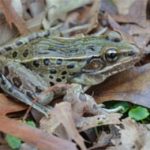
![]() Maintain pockets of protection and refuge (to counteract forces decreasing biodiversity) by: 1) fighting to preserve wet areas as sanctuaries for frogs, and birds when they are designated for filling in, 2) opposing plans for spraying the roadside edge with chemical herbicides, 3) speaking up for retaining hedges as bird habitats when they are designated for removal. Your calling is the intersection of your great joy and the world’s great need. Go to that place; Do that work.
Maintain pockets of protection and refuge (to counteract forces decreasing biodiversity) by: 1) fighting to preserve wet areas as sanctuaries for frogs, and birds when they are designated for filling in, 2) opposing plans for spraying the roadside edge with chemical herbicides, 3) speaking up for retaining hedges as bird habitats when they are designated for removal. Your calling is the intersection of your great joy and the world’s great need. Go to that place; Do that work.
![]() Call attention to any failure to give sufficient attention to scientific input especially where environmental actions and policies are concerned, locally and/or nationally.
Call attention to any failure to give sufficient attention to scientific input especially where environmental actions and policies are concerned, locally and/or nationally.
![]() In Response to the possible Zika threat in your area – require county and state governments to focus on educating citizens about: the various means of transmission for this viral disease, how to prevent mosquito breeding in yards, effective personal protection from mosquitoes, the hazards and lack of effectiveness observed for chemical insecticide sprays used against adult mosquitoes. Our report on Zika in Maryland will be available soon on RCLA web site.
In Response to the possible Zika threat in your area – require county and state governments to focus on educating citizens about: the various means of transmission for this viral disease, how to prevent mosquito breeding in yards, effective personal protection from mosquitoes, the hazards and lack of effectiveness observed for chemical insecticide sprays used against adult mosquitoes. Our report on Zika in Maryland will be available soon on RCLA web site.
![]() Empower another person, a wild animal, a natural resource, or a neighborhood by helping him/her/it to find an ecological voice.
Empower another person, a wild animal, a natural resource, or a neighborhood by helping him/her/it to find an ecological voice.
![]() Share a “sense of wonder” nature experience with a person of another generation (Click here for RCLA’s “Sense of Wonder” brochure)
Share a “sense of wonder” nature experience with a person of another generation (Click here for RCLA’s “Sense of Wonder” brochure)
![]() Make environmental issues a high priority in memory of Rachel Carson.
Make environmental issues a high priority in memory of Rachel Carson.
By Diana Post & Munro Meyersburg May 2017

